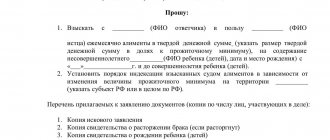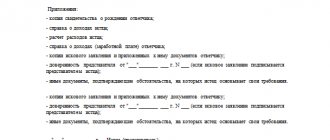Avoiding financial assistance to one’s own child is a common practice in modern society. However, an irresponsible parent can be held accountable in court. In this article we will talk about:
- how to correctly draw up a statement of claim;
- in which court the document is filed;
- why the claim may be refused;
- Is it possible to make alimony claims against a spouse?
- Where can I find a sample application?
What is a statement of claim and when is it necessary?
This is a document that is necessary in order to oblige a parent who avoids financial participation in the life of a child to provide financial assistance on an ongoing basis. Filing a lawsuit helps the person with whom the child lives to force a settlement on the frequency and amount of financial assistance from the defendant.
Evasion from financing the life of a child not only causes moral censure on the part of the parent (plaintiff) or attacks of conscience on the part of the defendant, but is prosecuted by law.
Inaction of bailiffs
If the recipient of alimony diligently submitted applications for recalculation of the debt for alimony, used current samples and contributed in every possible way to the work of the bailiffs, but no result was achieved, it is necessary to file a complaint about the inaction of the service employees. The applicant will receive a response in the form of a letter, as well as the right to change the service employee.
The complaint states:
- The circumstances that led the applicant to the conclusion that the bailiff was inactive;
- The essence of dissatisfaction with his work;
- Please appoint another bailiff or speed up the work of the current one.
What actions will the court take?
The statement of claim is sent to the magistrate's court at the location of one of the disputing parties. If the statement of claim is correctly drawn up and there is a sufficient evidence base (which we will discuss below), the court within 30 days:
- will accept the application for production;
- will determine the amount of alimony for the child, as well as for the former pregnant spouse or non-working mother, if the offspring is not yet three years old;
- will issue a writ of execution for sending to the Bailiff Service.
Let us note that the obligation to pay the state duty is placed on the defendant by the Tax Code of the Russian Federation (Article 333.36).
Recalculation
The Law on Enforcement Proceedings provides the opportunity to index alimony through bailiffs. If the cost of living is officially increased, alimony collected in a fixed amount is subject to a corresponding increase.
The amount of the increase is determined in proportion to the increase in the cost of living for the corresponding population group established in the Russian Federation. The bailiff is obliged to make a decision on the indexation of alimony.
Read more about the procedure for recalculating alimony in a separate article on our website.
Structure of the claim
- Court information:
- name of the court;
- its location.
- Details of the disputing parties:
- residential addresses of the plaintiff and defendant;
- their contact details.
- Contents of the claim:
- who the child is between the plaintiff (parent or guardian) and the defendant;
- grounds for paying alimony, for example, the defendant’s reluctance to financially help the child or the presence of circumstances that require increased financial assistance to the child (illness, expensive education);
- evidence base, for example, divorce of spouses, history of correspondence with the defendant, testimony of witnesses.
Important: it is necessary to adhere to the official business style of the content of the document, without emotional statements and secondary information.
- Claim:
- the plaintiff’s proposals for the payment of alimony, for example, in a fixed monetary amount or a percentage of the defendant’s monthly profit;
- justification for the preferred amount of alimony;
- contact details of witnesses who may testify in court.
Important: when choosing the percentage amount of alimony, up to 25% of a parent’s income is usually assigned for one child, up to 33% for two children, and up to 50% for three or more children.
The choice of a fixed amount is justified if the parent does not have a stable income.
- List of attached documents:
- copies of passports of the plaintiff and defendant;
- child's birth certificate;
- passport of a child over 14 years old;
- documents indicating the financial irresponsibility of the disputing party in relation to the child (written witness statements);
- divorce certificate;
- information about the employment of the disputing parties;
- information about the plaintiff’s income;
- certificates from the child’s educational institution, including additional educational organizations;
- medical report on the child’s disability;
- written evidence that the plaintiff has other dependents in his care.
Responsibility
In the vast majority of cases, a man cannot refuse to pay alimony on his own. Even if he lost his job or other source of income, payments will still have to be made. Only the court can exempt from payments in exceptional situations.
It is definitely worth monitoring other situations in which the debtor may try to hide his income. For example, if he works as an individual entrepreneur, he will also have to make payments. Only there is quite complicated accounting, which you will need to understand together with the bailiffs.
The same applies to situations where the defendant at work receives severance pay upon dismissal, financial assistance or money for vacation. In these cases, payments must also be made.
Remember, if the debtor’s salary is increased or your child is disabled, you can also demand an increase in the amount of alimony. However, there are circumstances in which they may be reduced, for example if the defendant becomes injured or disabled. It is important to monitor this very carefully.
Also remember, if you do not agree with the decision, or think that the amount of alimony is set too low, you can file an objection to the court about this.
If the defendant does not make payments, or he has accumulated a large debt, you have the right to calculate the penalty and demand compensation through the court.
In some cases, bailiffs may even initiate criminal proceedings. If the debtor maliciously evades payments, you have the opportunity to deprive him of parental rights.
You can file for alimony in court: at any time, if there is no agreement
Clause 1 of Article 107 of the Family Code of the Russian Federation
Child support can be collected for the previous 3 years: if the parent evaded paying it
Clause 2 of Article 107 of the Family Code of the Russian Federation
An application to the court for the recovery of alimony can be submitted: at the place of residence of the plaintiff
Clause 3 of Article 29 of the Code of Civil Procedure of the Russian Federation
How to file a claim
You can personally submit your application to the Magistrates' Court. To do this, you must register an application with the court registry department. It is necessary to prepare two copies of the statement of claim: one is submitted to the court, and your copy is marked with a note indicating its receipt and further consideration.
The document can be submitted by registered mail. In addition to the application, the envelope should include a list of attached documents. Once the court receives it, you will be sent a notification that it has been accepted for consideration.
Writing a letter to bailiffs
The letter to the bailiffs is a statement, a sample of which you can download below.
The application is submitted to the region/region of residence of the debtor. As can be seen in the sample application for bailiffs, the document must contain information:
- Number of the judge’s decision to assign a maintenance obligation to the payer;
- Recipient's account number, TIN;
- A separate line is a list of documents attached to the application;
- Contact information about the recipient;
- Amount of debt (collection);
- The essence of the application is a request to recover funds from the debtor in favor of the recipient.
Why a claim may be refused
The Code of Civil Procedure of the Russian Federation (Article 134) provides for the following reasons for refusal:
- The application cannot be considered in a civil trial.
- There is already a court decision on this issue for these disputing parties.
- There is an arbitrator's ruling on this case.
- Jurisdiction was not observed (the statement of claim was sent to the wrong court).
- The disputing parties did not attempt to resolve the dispute out of court.
- The plaintiff is an incapacitated person or a person who cannot act as a plaintiff in this dispute, for example, the aunt of a minor with whom he lives, but there is no official guardianship.
Re-submitting an application is possible only after eliminating the reasons for refusal, which were indicated by the court in the notification.
Who has the right to collect alimony after a divorce?
Article 90 of the RF IC establishes a list of persons who have the right to demand alimony:
- Ex-wife during pregnancy, including from the moment of the birth of their common child until he reaches the age of three;
- Former spouse caring for a child with a disability until the age of 18;
- A needy spouse who was declared incapacitated during the marriage or for a year after the divorce;
- A husband or wife who reached retirement age within 5 years after the divorce, if the marriage was long-lasting.
- An adult child who has lost the ability to work and needs financial support.
- Guardian of an adult child if he is declared incompetent. Usually the mother submits the application.
There is no exact wording of long-term marriage in the laws. Typically, a marriage is recognized as long lasting if at least three years have passed from the date of its conclusion to its dissolution.
Collection of alimony debt after 18 years: procedure and deadlines
What documents are needed to apply for alimony? Full list
Arbitrage practice
Most often, parents with whom children remain collect alimony after the divorce, although this can be done before.
Let's look at a few examples from real practice:
- The plaintiff collected alimony for their common minor daughter from the defendant. By decision No. 2-617/2019 2-617/2019~M-639/2019 M-639/2019 dated December 9, 2021, in case No. 2-617/2019, he was obliged to pay monthly 1/4 of all types of earnings.
- A disabled woman of group II collected alimony in the amount of 2,000 rubles from her ex-husband. on itself (Decision No. 2-880/2020 2-880/2020~M-550/2020 M-550/2020 dated May 22, 2021 in case No. 2-880/2020).
- The woman collected alimony from her ex-husband in the amount of 0.2 monthly wages until the youngest child reaches the age of three (Decision No. 2-210/2020 of May 20, 2021 in case No. 2-210/2020).
Consideration by the court of a case on the collection of alimony for children
As a general rule, the court will consider the case within 2 months from the date of acceptance of the claim. To consider the case, a court hearing is scheduled, to which the plaintiff, defendant, and third parties are invited.
When considering the case, the court will determine whether the plaintiff has the right to collect alimony, whether the defendant is obliged to pay it, and whether the child receives the necessary maintenance from the parents. And will determine the size of this content.
The consideration of the case ends with a decision. With this decision, the court collects alimony or refuses to satisfy the requirements.
If they disagree with the court's decision, the parties have the right to appeal it (appeal). The court decision comes into force immediately.






